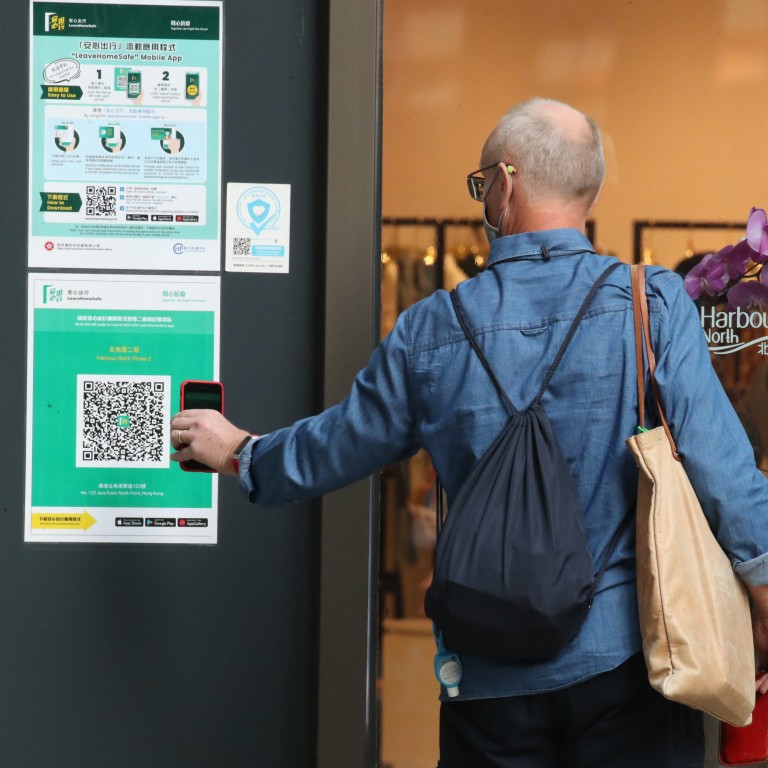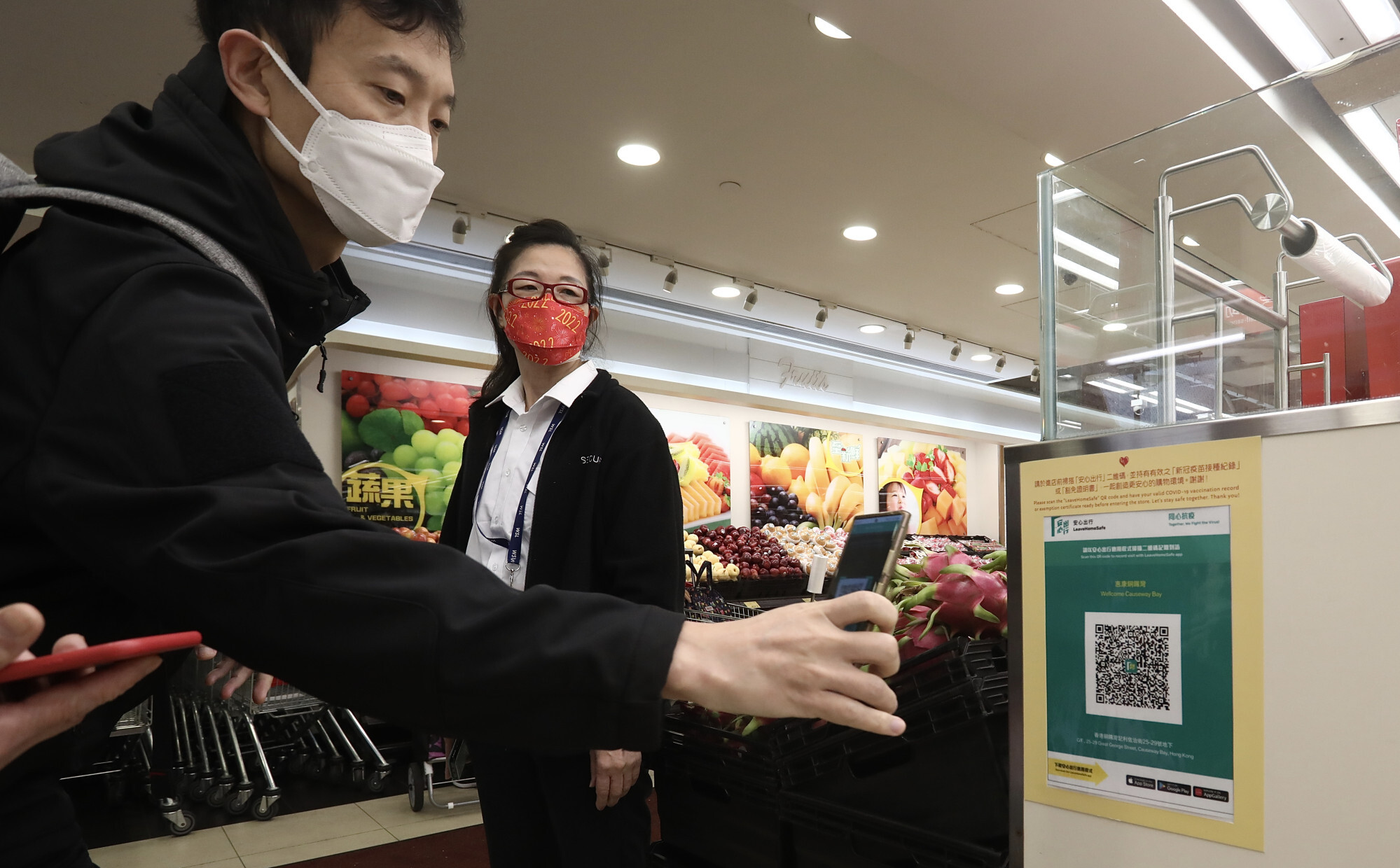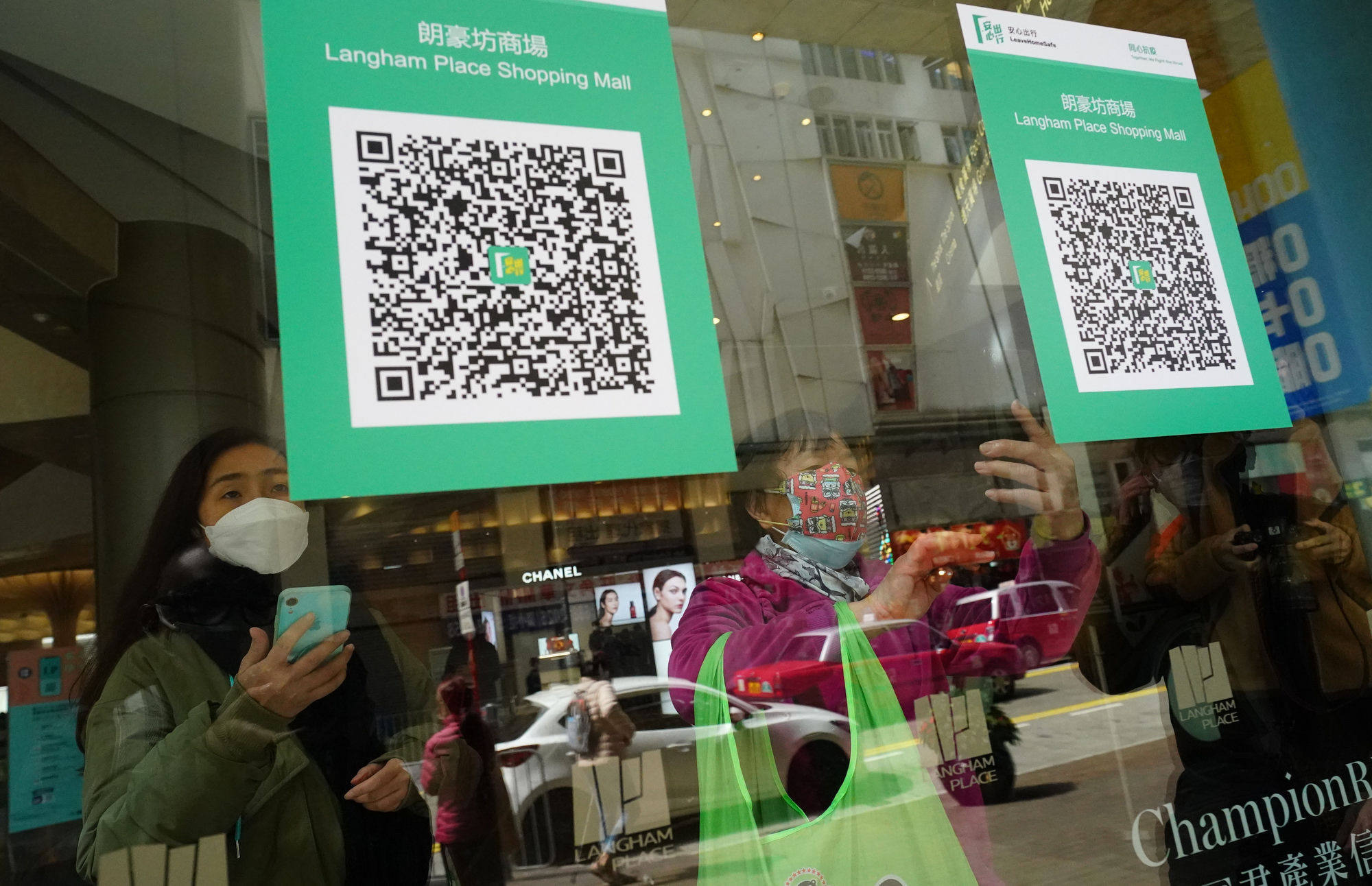
Hong Kong vaccine pass: most ignore rules and get away with it, as there are few checks with hardly anyone booked
- Pandemic expert says scheme pushed more residents to get vaccinated and that’s what matters
- Police carried out 20 spot checks in two months, issued only one ticket, booked two restaurant patrons
Two months after Hong Kong introduced a vaccine pass for entry to shopping malls, restaurants and other public premises, residents are mostly ignoring the rules and getting away with it.
People are not stopped if they do not use their “Leave Home Safe” smartphone app to scan QR codes to register their entry to these premises.
Student Tony Lai, 22, said having to scan different QR codes at the lobby of a shopping centre and at shops and the food court was just too much of a bother and that was why most people ignored the rules.
“The government just wanted us to get our Covid-19 vaccine by implementing these cumbersome rules,” he said.
If the government was serious about the vaccine pass, he argued, the rules should be enforced more strictly by the police.
Hong Kong’s vaccine pass is a vital, and secure, tool in war on Covid-19
Under the vaccine pass scheme introduced on February 24, those aged 12 and above must use their the app to show proof of having received at least one dose of a Covid-19 vaccine when entering government venues and 23 other types of premises, including restaurants, shopping centres, wet markets and supermarkets.
More residents have been vaccinated, as the government hoped. The proportion with one jab rose from 81.7 per cent when the vaccine pass scheme began on February 24, to 88.4 per cent of the population, or 6.5 million people, as of Friday.
The proportion of those with two jabs rose from 69.6 per cent when the scheme began to 79.9 per cent of the population, or 5.9 million.

Government pandemic adviser Professor David Hui Shu-cheong said the vaccine pass scheme was a good public health measure to boost the vaccination rate.
“Vaccination offers good personal protection against severe disease, hospitalisation and death, and more freedom in social activities,” he said.
Hui said the scheme was introduced with the right intentions, and it was more important for people to get vaccinated than being penalised for not following the rules.
What is Hong Kong’s Covid-19 vaccine pass scheme and how does it work?
Meanwhile, checks by the Post showed that most people were ignoring the vaccine pass rules. At Times Square in Causeway Bay, a check on Thursday afternoon found that fewer than 20 out of over 1,400 people entering the shopping centre over a 30-minute period stopped to register their entry. The rest just went in.
It was the same at nearby Hysan Place nearby, where only about 60 of the 500 people who entered the shopping centre over 30 minutes paused to scan the QR code.
And over in Kowloon, more than two-thirds of about 200 people entered the Lok Fu wet market over an hour at midday without checking in.
“I could not free one of my hands to scan the QR codes while carrying lots of groceries,” said housewife Lisa Cheung, 52.

Staff of certain premises, such as restaurants and clubhouses, are expected to check patrons’ vaccine or exemption records, while customers must scan a QR code.
Breaching the vaccine pass requirements is an offence with a maximum fine of HK$10,000 (US$1,275), but very few people have landed in trouble so far.
The police said on Thursday that they had carried out 20 spot checks since the scheme began. They handed out only one penalty ticket at a wet market, and two restaurant patrons were prosecuted for flouting the rules.
“We have to emphasise that self-discipline and community solidarity in fighting the disease are of utmost importance,” said a police spokesman.
Half of Hong Kong restaurants have ‘no idea’ how to enforce vaccine pass scheme
Venues such as shopping centres, supermarkets, department stores and wet markets are only subject to passive checks by law enforcement officers who ask to see vaccination records.
At 6.30pm on Thursday at a Causeway Bay supermarket, only about 10 per cent of 300 shoppers followed the rules before entering.
“Those who didn’t actively produce their vaccination records proceeded at their own risk, as police officers in plain-clothes conduct spot checks,” said an employee who only gave his surname, Wong.
The Food and Environmental Hygiene Department said in a statement that it would have conspicuous signs at market entrances to let people know they have to check in under the vaccine pass rules.
Lawmaker Peter Koon Ho-ming agreed that the vaccine pass scheme called for Hongkongers to demonstrate “self-discipline”, but he noted some had complained that it was too disruptive having to check in a few times each day when they went out.
“The arrangement was aimed at boosting the Covid-19 vaccination rate, rather than enforcing the law,” he said.
He felt the government should review the vaccine pass scheme before bringing it back in future waves of Covid-19 infection.
The city’s overall tally of infections since the pandemic began stood at 1,188,262, with 8,705 fatalities.

